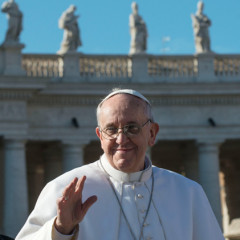
In his first general audience since his election to the papacy, Pope Francis on Wednesday (March 27) urged Catholics to leave their comfort zone to search for “lost sheep.”
As the Catholic Church prepares for Easter and celebrates the rites of Holy Week, Francis told around 20,000 people in St. Peter’s Square to avoid “a tired and routine way of living the faith,” and resist “the temptation to withdraw into pre-established patterns that end up closing our horizon” to God.
“We must not be content to remain in the enclosure of the 99 sheep; we have to step outside, to search for the lost sheep,” he added, referring to a parable of Jesus.
The call to the church to venture toward the “peripheries” has become one of the recurring themes of Francis’ pontificate — and reportedly paved the way for his election as Pope Emeritus Benedict XVI’s successor in the Sistine Chapel on March 13.
Cardinal Jaime Lucas Ortega y Alamino of Havana, one of the 115 cardinals that took part in the conclave, recently released to the website of the Catholic magazine Palabra Nueva a handwritten note by Francis outlining the speech he gave at one of the closed-door pre-conclave meetings of cardinals.
According to Vatican Radio, which published an “unofficial translation” of the note, Ortega had been so impressed with the speech that he asked then-Cardinal Jorge Bergoglio for a copy. L’Osservatore Romano, the Vatican’s semiofficial newspaper, also published it.
In the note, Bergoglio warns that when the church becomes too inward looking, it suffers from “theological narcissism.”
“When the Church is self-referential, inadvertently, she believes she has her own light … and gives way to that very serious evil, spiritual worldliness … living within herself, of herself, for herself.”
Recognizing this is the starting point for the “possible changes and reforms” within the church, he wrote.
The reform of the Curia — the administrative apparatus of the Holy See — sits high on Pope Francis’ agenda after years of scandals and mismanagement, which culminated in the so-called Vatileaks case.
Everything surrounding the conclave is supposed to be secret according to Vatican law, but in recent weeks, many cardinals have confided details and anecdotes about the run-up to Francis’ election.
Cardinal Angelo Comastri, archpriest of St. Peter’s Basilica, revealed in a Vatican TV documentary that, immediately after being elected, Bergoglio said, “I am a great sinner; trusting in God’s mercy and patience, in suffering I accept.”
Unlike his predecessors, on Wednesday Francis spoke only in Italian and didn’t read greetings to pilgrims in various languages.
In fact, since his election, the Argentine has spoken almost exclusively in Italian.
While this has raised doubts about his command of other languages, including English, observers point out that Francis has avoided speaking even in his native Spanish, hinting that he has been sticking to Italian, the natural language of the bishop of Rome, to avoid favoring some languages over others.






